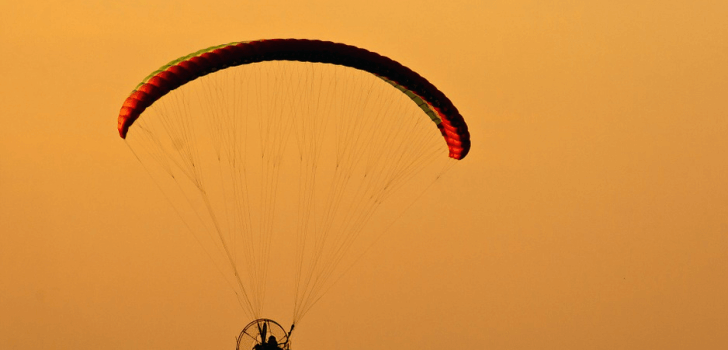It sounds like a plot from a movie, but one British conservationist is planning to fly 4,500 miles across the Russian Arctic using a motorized parachute called a paramotor in order to help save a species of swans. Sacha Dench will begin her journey late next year, and she will have to brave temperatures of about 16 degrees Fahrenheit in order to keep up with the Bewick’s swans, which are some of the smallest and most endangered swans in the United Kingdom.
Dench is planning to use the paramotor to mirror the migration route of the Bewick’s. The swans are known to migrate once the winter of Northern Russia becomes inhospitable. From there, the birds make their way west to Great Britain and other warmer environments. By following the swans, Dench hopes that she can learn more about what kind of troubles they may facing.
Currently, there are only about 16,000 Bewick’s swans left in the world. Over the past two decades, their population has been cut in half. Wildlife experts are still not sure why the number of these swans has fallen off so rapidly. It is believed that many of the swans have been killed by hunters, habitat destruction and climate change.
For now, Dench will have to get used to flying in very cold weather in remote parts of the world. Much of her route will be flown over parts of Europe that have no roads whatsoever. Dench believes that she can get used to the bitter cold.
Dench said, “We have to get used to flying in the cold; it could be (-16 degrees Fahrenheit). Taking off is one thing, it’s energetic, but once you’re flying you’re reasonably static, you’re just moving your arms. If you get too cold, your decision-making gets sloppy. If your feet get too cold, you can’t land on them, because you need to land running.”
Since Dench will have to run in order to take off, she will also have to become accustomed to running with heavy weight on her back. Her kit, fuel and the paramotor will weigh somewhere between 75 and 90 pounds.
Dench explained, “I can carry that at the moment, but the thing is being able to run with it, to take off.”
And since the birds are early risers, Dench will have to get used to waking up as early as 3am in order to keep up with the birds. Each flight with the Bewick’s could last up to three hours, but this will largely depend on the weather.
Dench continued, “The chances of being stopped by weather are really, really high.”
Dench will have some support in her efforts. Her team will include a yet-to-be determined pilot and Russian national Alexander Bogdanov. The team will have several backup plans in place in the event that something goes wrong.
With Bogdanov on her side, Dench will be able to better communicate with any wayward Russian communities that she might come across on her journeys. Nevertheless, Dench is also learning Russian so that she can be better prepared.
Over the course of ten weeks, Dench will cover ten different countries. The ultimate goal will be to come up with an action plan to save the Bewick’s swans from possible extinction.
Dench said, “We know that there are multiple impacts. Shooting is a considerable one. About a quarter of Bewick’s had a shot in them when we x-rayed them at Slimbridge. But even at that high rate, it doesn’t seem to be solely responsible for their decline.”
Besides hunters, other factors relating to the decline of the swans are believed to be the loss of wetlands, the disturbances of their habitats and more predation from Arctic foxes.
Dench is planning to start her journey at NarYan Mar in the Arctic Tundra and ultimately land at Slimbridge by the time November comes around. Time will tell if Dench and her team will be able to save the swans.
Stay Connected